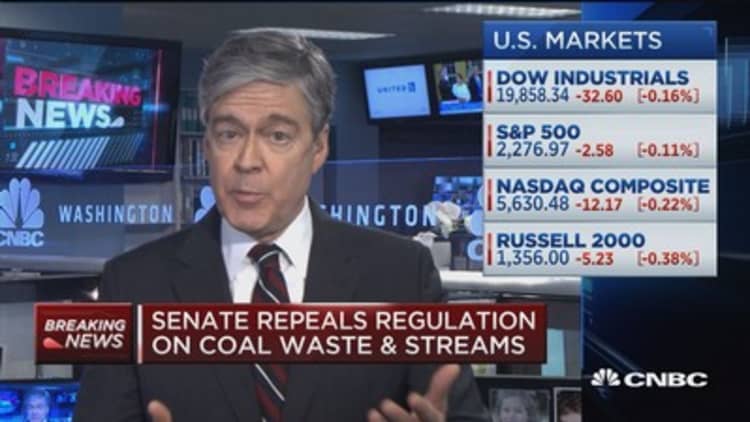
The U.S. energy industry's core argument against an anti-corruption rule struck down by President Donald Trump and congressional Republicans does not hold water, supporters of the regulation say.
Earlier this month, Republican lawmakers invoked the rarely used Congressional Review Act to kill the rule, which was created by an amendment to the 2010 Dodd-Frank financial regulations. On Tuesday, Trump signed the measure.
It was the first time Trump approved a measure taken by congressional Republicans under the CRA to kill an Obama-era regulation.
The rule, which was originally introduced by former Sen. Richard Lugar, a Republican, and Democratic Sen. Ben Cardin, requires oil, gas and mining companies listed on U.S. stock exchanges to disclose how much they pay to foreign governments.
The idea that American firms would be at a competitive disadvantage has certainly been undercut if 80 percent of the largest firms in the world are making a report.Richard Lugarpresident and chairman, the Lugar Center
The goal is to prevent foreign leaders from skimming off the payments that drillers and miners make to their countries. Such corruption, which enriches the politically connected but deprives regular people of their country's mineral wealth, is known as the "resource curse."
"I believe that the effect would have been to rein in a good bit of the corruption, simply because there would have been public information and therefore debate within the various countries," said Lugar, who is now president of think tank the Lugar Center.
Congress scrapped the rule, but not the Cardin-Lugar Amendment itself. That means the SEC will have to come up with a new disclosure rule.
The American Petroleum Institute, the chief U.S. energy lobbying organization, and its Republican allies say the rule puts U.S. companies at a disadvantage, because their foreign competitors are not subject to the requirements.
In a Wall Street Journal op-ed last month, House Leader Kevin McCarthy said the rule "adds an unreasonable compliance burden on American energy companies that isn't applied to their foreign competitors."
But that's largely false. Major European drillers like BP, Total and Royal Dutch Shell, as well as Canadian firms and Russian oil and gas giants Rosneft and Gazprom, must report what they pay to foreign governments, Cardin and Lugar said in an op-ed. The U.S. rules would force some Chinese and Brazilian firms to do so, as well, they said.

In praising Republicans for killing the rule, the American Petroleum Institute said it "is inconsistent with other major international reporting regimes, like the Extractive Industries Transparency Initiative (EITI) and the European Union's disclosure rules."
That is not the view of the SEC.
In making the rule, the SEC said European and Canadian regulations are "substantially similar." In fact, the commission said a company that satisfies the conditions of the EU, Canadian, or EITI rules will satisfy the requirements of the U.S. regulation.
The EITI is a voluntary reporting system that the industry generally supports. The SEC's rule would have put some additional requirements on companies that report through EITI.
Asked for comment, McCarthy's office insisted that the disclosure rule causes "immense reporting efforts that foreign competitors do not have to adhere to" and that it forces companies to share proprietary information.
In a letter to the acting SEC chairman this month, six Senate Republicans said U.S. companies would be required to disclose payments to foreign governments even when the laws of that country forbid such disclosures. They said that could force U.S. companies to stop doing business in those markets, leaving them wide open to foreign competitors.

During the SEC comment period, no one produced evidence that any country prohibits these disclosures, according to Publish What You Pay, a group that advocates for greater transparency in the energy industry. Foreign oil companies already disclosing payments have not suffered repercussions, it added.
"Nonetheless, the Cardin-Lugar provision contains safeguards to ensure that companies that face a legitimate problem can apply for an exemption from disclosure on a case by case basis," Publish What You Pay said in a fact sheet.
To be sure, drillers and miners that are not listed on U.S., European or Canadian exchanges are not subject to disclosure rules.
But 84 of the world's biggest 100 oil and gas companies were listed or cross-listed on U.S., European or Canadian exchanges, according to research submitted to the SEC by Publish What You Pay.
"The idea that American firms would be at a competitive disadvantage has certainly been undercut if 80 percent of the largest firms in the world are making a report," Lugar said.
Fifty-eight of the top 100 miners were listed on an exchange with transparency rules.
Companies are already required to track payments — but not report them — under the Foreign Corrupt Practices Act. For that reason, it would not be burdensome for them to make that information public, transparency advocates say.
More trouble for drillers and miners?
Overturning the rule could actually make things more difficult for energy companies listed on both U.S. and foreign exchanges, said Zorka Milin, senior legal adviser for Global Witness, an anti-corruption and environmental group.
Under the Congressional Review Act, a new rule cannot be substantially similar to the original one. Since the first disclosure rule was "substantially similar" to European and Canadian regulations, it will be difficult to create a new rule that dovetails with those foreign regulations and meets the requirements of the Congressional Review Act.
That would likely lead to the creation of two different rules with which dually listed companies would need to comply, Milin said.
That assumes Republican lawmakers will not scrap the Cardin-Lugar Amendment altogether. There is some evidence they will not.
The six Senate Republicans who signed the letter to the acting SEC chairman acknowledged that the SEC would have to create a new rule.
Further, they said they "are open to supporting legislative or other solutions that might be appropriate to address any issues that might be posed by the Congressional Review Act's restrictions on the similarities between the SEC's new rule and this now disapproved rule."
Asked what hope he has of the rule surviving, Lugar said, "I'm always hopeful, but I'm certainly startled that repeal of the Cardin-Lugar Amendment would be such a priority for the Congress now."



